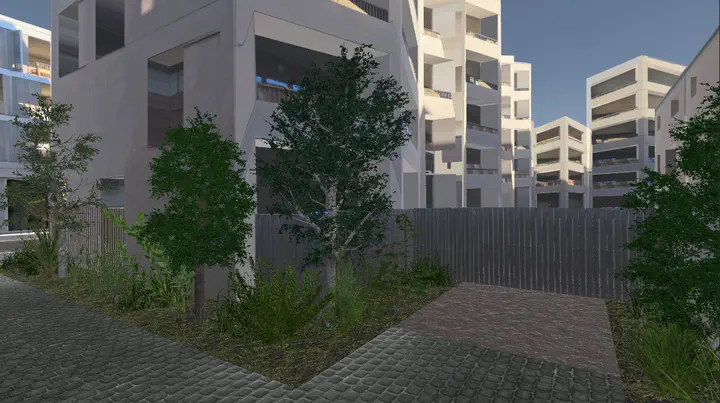Pooria BANADIAM's PhD
 A virtual environment including elements of nature in an urban context.
A virtual environment including elements of nature in an urban context.Pooria BANADIAM’s PhD is entitled “he experience of nature in virtual urban environments – analyses and applications in the design of sustainable urban projects”, and started in January 2022. It is co-directed by Daniel SIRET, Franck MARS and by myself. Pooria’ PhD is funded from a CNRS 80 PRIME grant involving the AAU as well as the LS2N laboratories.
Summary:
“Renaturing” urban environments reflects the ambition of transforming our cities into milieus that are more resilient from an environmental point of view and more human from the perspective of healthcare, quality of life and well- being of populations. Several forms of “elements of nature” thus regain a place in contemporary urban projects in response to the ecological, social and economic challenges of urban renewal. With Nature-Based Solutions (NBS), installations such as urban micro-forests, available water bodies or insect hotels integrate public space and change the perception of citizens’ relation to nature, creating new experiences of “urban nature”.
The thesis aims to determine how virtual reality can help understand the experiences of urban nature in the implementation of an urban development project. Recently, technologies of virtual or augmented reality have been used to assess the perception of natural environments compared to urban environments [1, 2, 3, 4]. However, these examples have methodological limits (division between “natural” and “urban”, use of 360° video) that this thesis will overcome. We aim to analyse the integration between natural and urban elements, to implement virtual devices that will allow the easy modification of the types of configurations studied and to distance ourselves from existing situations.
The future PhD student will be tasked with the development of immersive environments integrating different elements of nature within urban environments. They will carry out experiences on the perception of these complex environments by immersed participants who are interacting with these virtual environments. In order to apprehend every dimension that determines the participants’ experience, its assessment will be done with a set of explicit (questionnaires, interviews) and implicit (oculometry, physiological responses) measures of cognition, including emotions. De- pending on the candidate’s competences, this experience could be modelled with advanced statistical approaches.
The main scientific challenges lie both in the modelling of the qualifiers of the participants’ subjective perception in “naturalized” urban environment and in the transposing of assessment methodologies for the in-situ human experience in virtual environments. Another aspect of the research deals with the forms of expression and representation of non-visual aspects of natural elements, in particular their climate dimensions.